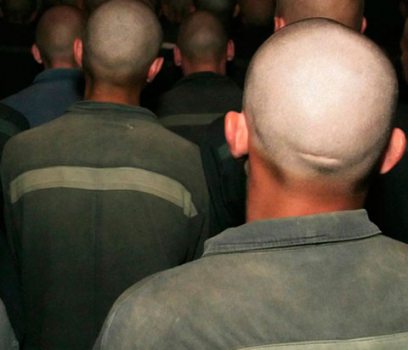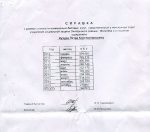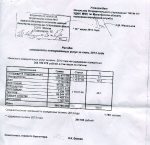How prisoners live “on taxpayers’ money”: utility bills from Mahiliou colony No. 15
Minsk resident Liudmila Kuchura, whose husband is serving his sentence in the Mahiliou-based penal colony No. 15, received a certificate of municipal services covered by prisoners, as a reply to her request sent to the Foreign Ministry’s Department of Corrections.
Mrs. Kuchura told human rights defenders of the HRC “Viasna” that in early December she filed a complaint with the Department of Corrections: “My husband is now held in a cell-type room with extremely poor conditions – poor lighting, low temperature, so he asked them to give him a sweatshirt, and they refused. And I know that he covers municipal services. Of course, I was interested in the question of how much he pays for such conditions there, and I requested information.”
In response to the complaint, Head of the Department Siarhei Daroshka says:
“In accordance with Article 102 of the Criminal Executive Code of the Republic of Belarus the wages and similar income of convicts are subject to deduction for the reimbursement of food, clothing and footwear, utilities. The procedure for calculating compensation and reimbursement is established by the Ministry of Internal Affairs in consultation with the Ministry of Finance of the Republic of Belarus. [...] Correctional institutions calculate monthly expenditures for each convict (including municipal services) on the basis of actual costs.”
The reply is supplemented with information on the actual costs used to calculate the cost of municipal services, as well as information on payments withheld from Piotr Kuchura’s pension for 2013. According to this information, the prisoners’ bills include monthly payment of heating, water and sewage, garbage collection, staff salaries, depreciation, detergents, disinfestation (measures to destroy rodents).
For example, the bill of June 2013 says that the convicts held in penal colony No. 15 had to pay 364,789,289 rubles, i.e. with the average number of people of 1,780 prisoners, each inmate’s bill is amounted at 204,938 rubles (approx. USD 21).
According to the certificate, Piotr Kuchura is to pay 2,667,000 rubles (USD 281) in 10 months of 2013.
Liudmila Kuchura says she can’t keep in her indignation: “I was amazed that he pays so much in the colony, as much as I pay for my good two-bedroom apartment, where it is warm, light, there is hot water and I can take bathroom ten times a day. And my husband, like all prisoners, can wash only once a week, and the convicts complain it is not hot enough to wash. To all, he lives in a common room, where there can be 20-30 people. It turns out that he pays too much for his imprisonment.”
Liudmila notes that this information should be communicated to people who usually argue that “we, the taxpayers, provide for these prisoners,” etc. "Not at all, let the taxpayers not be worried about their pocket. Convicts pay for themselves. This is confirmed by the example of my husband. In fact, besides these bills they pay for their food, clothing and footwear. I mean, I do not understand the people who say such things. Maybe there is some category, but most of the convicts are paid for by their relatives. The state does not support them,” she said.
According to the woman, in all the years of his detention in Mahiliou colony No. 15 (since December 2008), her husband has never received any toilet paper or toothpaste and brush, no soap – the minimum that should be granted to prisoners by the state.
It should be noted that Piotr Kuchura has a disability for heart disease and receives a disability pension, from which all of the payments are withdrawn. Above all, by order of the Ministry of Justice prisoners are charged 90 % of their salary to compensate the claim. Simple calculations inevitably lead to the question: where can he take money for medicines?




















